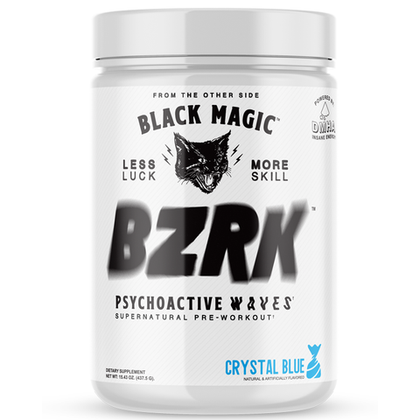
Exposed: The Surprising Truth Behind Pre-Workout Myths!
|
|
Time to read 3 min
Introduction
Are you one of the many gym-goers who have heard a lot about pre-workout supplements but aren't sure what to believe? Maybe you've heard that pre-workout is only for hardcore bodybuilders or that all pre-workout supplements are the same. Well, it's time to debunk these myths and uncover the truth about these popular fitness aids.
As a fitness enthusiast myself, I've navigated the maze of misinformation surrounding pre-workout supplements. In this article, we'll explore what pre-workout really is, bust some common myths, and help you understand how it can benefit your fitness journey. Whether you're a seasoned athlete or just starting, this guide will provide the insights you need to make informed decisions about using pre-workout supplements.
What is Pre-Workout? Understanding the Basics
Pre-workout supplements are designed to help you maximize your training sessions. They typically contain a blend of ingredients like caffeine, amino acids, vitamins, and sometimes creatine, all aimed at boosting your energy, endurance, and focus during a workout.
Myth #1: Pre-Workout Supplements Are Just for Bodybuilders
The idea that these supplements are exclusively for bodybuilders is a widespread misconception. In reality, they are incredibly versatile and can be beneficial for a wide range of fitness enthusiasts. From runners to cyclists, and even those engaged in regular fitness classes, these supplements offer an energy boost that can enhance overall performance. When I first integrated them into my routine, I noticed a significant improvement not just in my energy levels, but also in my focus and endurance. This was particularly evident during my jogging sessions, where I could maintain a steady pace for a longer duration without feeling overly fatigued.
Myth #2: All Pre-Workout Supplements Are Essentially the Same
This myth fails to recognize the diversity and specificity of these supplements. Each product on the market has its unique formula designed to target different aspects of a workout. For instance, some are tailored to increase endurance, making them ideal for long-distance runners or cyclists. Others might focus on boosting strength, which can be particularly beneficial for weightlifters or those engaging in high-intensity interval training. When selecting a supplement, it’s essential to consider what your specific fitness goals are. Are you looking to improve your stamina, increase your strength, or maybe just need that extra push to get through an intense workout session? Understanding your needs will guide you to the right product.
Myth #3: Pre-Workout Supplements Are Unsafe
Concerns about the safety of these supplements often arise due to misinformation or misuse. It’s vital to approach them with the same caution as any other dietary supplement. This means understanding what’s in them – particularly if they contain stimulants like caffeine, which can affect individuals differently. Adhering to recommended dosages is key. Overuse or ignoring the guidelines can lead to adverse effects. However, when used correctly, these supplements can be a safe and effective tool in enhancing your workout performance. I always advise starting with a smaller dose to gauge your body’s reaction and gradually increasing it as needed. Additionally, it's beneficial to consult with a healthcare professional, especially if you have any existing health concerns or are taking other medications.
The Science Behind Pre-Workout Ingredients
Let's delve into some common ingredients found in pre-workout:
- Caffeine: A well-known stimulant that can increase alertness and delay fatigue.
- BCAAs (Branched-Chain Amino Acids): Help in muscle recovery and growth.
- Creatine: Aids in improving strength and power output during intense exercise.
- Beta-Alanine: Can help improve muscular endurance.
Real Benefits vs. Marketing Hype
It's essential to differentiate between genuine benefits and marketing claims. While pre-workout supplements can enhance your training, they are not magic potions. Consistency in training and diet is still key.
How to Safely and Effectively Use Pre-Workout Supplements
- Start with a half dose to assess tolerance.
- Pay attention to timing; typically, it's best to take it 20-30 minutes before your workout.
- Stay hydrated, as some ingredients can lead to dehydration.
Success Stories: Transformations with the Help of Pre-Workout
Many fitness enthusiasts, including myself, have seen noticeable improvements in workout intensity and endurance after incorporating pre-workout supplements into our routines.
Choosing the Right Pre-Workout for You
Consider your fitness goals, any dietary restrictions, and ingredient preferences when selecting a pre-workout. Don't be afraid to experiment with different brands and formulations to find what works best for you.
Conclusion
Pre-workout supplements can be a valuable addition to your fitness regime. They can help you train harder and more effectively, but remember, they are supplements to a well-rounded fitness plan, not replacements. I encourage you to try pre-workout and see the benefits for yourself!
FAQ Section
Q: Can pre-workout supplements cause side effects?A: Some people may experience jitteriness or an upset stomach. It's important to follow the recommended dosages and consult with a healthcare provider if you have concerns.
Q: Can I take pre-workout every day?A: It's generally safe, but it's a good idea to cycle off occasionally to prevent tolerance build-up.
I'd love to hear about your experiences and thoughts on pre-workout supplements. Have you tried any? What myths have you heard? Share in the comments below and let's debunk these misconceptions together! Remember, an informed choice is always the best choice when it comes to your health and fitness.




